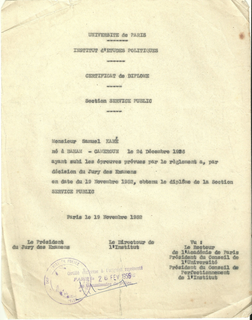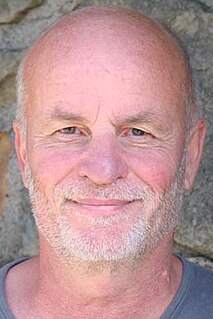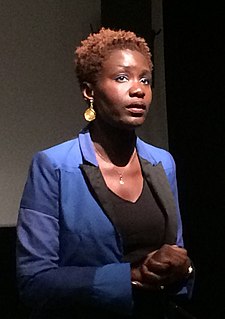
Reinhart Pieter Anne Dozy was a Dutch scholar of French (Huguenot) origin, who was born in Leiden. He was an Orientalist scholar of Arabic language, history and literature.

The Paris Institute of Political Studies, commonly referred to as Sciences Po Paris or just Sciences Po, is a grande école and grand établissement located in Paris and other cities in France.

Caroline Fourest, is a French feminist writer, film director, journalist, radio presenter at France Culture, and editor of the magazine ProChoix. She is the author of Frère Tariq, a critical look at the works of Muslim intellectual Tariq Ramadan which she and Mr. Ramadan later debated. She was also a columnist for Charlie Hebdo, for Le Monde until 14 July 2012, and she joined Marianne in 2016.

François Burgat, born April 2, 1948 in Chambéry, is a French political scientist and arabist, Research Fellow at the French National Centre for Scientific Research (CNRS) posted at IREMAM in Aix-en-Provence. He has been the Principal Investigator of the European Research Council research program "When Autoritarism Fails in the Arab World WAFAW" (2013-2017).
Haim Zafrani, born in 1922 in Essaouira-2004), was a Moroccan born French scholar and writer.

Richard Malka is a French lawyer, comics writer and novelist. As lawyer Malka in 2007 successfully defended Charlie Hebdo editor Philippe Val against charges of racism following the magazine's publication of Mohammad caricatures. Other clients include Clearstream, Dominique Strauss-Kahn and Caroline Fourest.
Karima Dirèche is a French Algerian historian specialising in the contemporary history of the Maghreb. From September 2013 to August 2017, she has been the director of the Institute for Research on the Contemporary Maghreb in Tunis.

Civitas, also known as France Jeunesse Civitas and Institut Civitas, is an association generally considered to be a Traditionalist Catholic, integrist, nationalist, and of the extreme right. The association defines itself as a "Traditionalist Catholic lobby group". The group was once associated with the Society of St. Pius X but it has evolved under the new leadership of Alain Escada and the "chaplaincy" is now provided by Capuchin Friars of Morgon.
Alain Ducellier was a French historian and professor emeritus at Université de Toulouse-Le Mirail who specialized in Byzantine studies and Christianity in the middle east. He was the author or editor of more than 40 books.

Rokhaya Diallo, is a French journalist, author, filmmaker, and activist for racial, gender and religious equality. According to The New York Times, she is “one of France's most prominent anti-racism activists.” She is a BET-France host and has produced and/or directed documentaries, television and radio programs. She has published: Racism: a guide, France Belongs to Us, France: One and Multicultural and How to talk to kids about racism, a graphic novel Pari(s) d'Amies, and Afro! featuring Afro-Parisians who wear natural hairstyles.
Edmond Doutté was a French sociologist, orientalist and Islamologist - both Arabist and Berberologist - but also an explorer of Maghreb.

Esther Benbassa is a French-Turkish-Israeli historian and politician. She is the author of many books of Jewish studies. She serves as a member of the French Senate, where she represents Paris. After several reports in the French press accusing her of bullying several of her parliamentarian assistants and trainees, in September 2021 Esther Benbassa was excluded from her group, the Greens, where she was a Vice-president.

The Soliman Shooting is a violent incident which occurred on January 3, 2007 in the Tunisian region of Soliman, south-east of Tunis. The national police forces fought an armed group calling itself "Asad ibn al-Furat's army" which had been initially labeled by the government as "dangerous criminals". A previous shooting involving this same group had taken place on December 23, 2006 placing it in a context of jihadist terrorism and anarchist, insurgent, Islamist militancy.
Islamophobia in France holds a particularly political significance since France has the largest proportion of Muslims in the Western world, primarily due to the migration from Maghrebi, West African, and Middle Eastern countries. The existence of discrimination against Muslims is reported by the media in the Muslim world. and by the perceived segregation and alienation of Muslims within the French community. This belief that there is an anti-Muslim climate in France is heavily criticised by some members of the French Muslim community who terms it an 'exaggeration'.

Fariba Adelkhah is a French-Iranian anthropologist and academic at Sciences Po who is currently detained in Iran.

Marc Fontecave is a French chemist. An international specialist in bioinorganic chemistry, he currently teaches at the Collège de France in Paris, where he heads the Laboratory of Chemistry of Biological Processes.
The Collective Against Islamophobia in France was a French non-profit organisation, created in 2003 and dissolved in 2020, which mission was to combat discriminations towards Muslims in France, providing legal support to victims of such discriminations. It annually reported acts it considered Islamophobic. The organisation received critics, about its use of the term Islamophobia, and suspicion of having Islamist links.

Jean-Christophe Attias is a French historian and scholar. He was born to an Algerian Jewish father and a Catholic mother from the Charente.
Omar Fetmouche is an Algerian artist, actor and playwright.

Ikjan is a town in the commune of Beni Aziz in the province of Sétif in Algeria.













